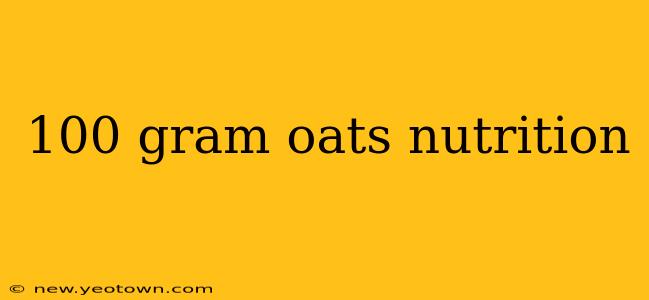Oats. Just the word conjures images of hearty breakfasts, comforting porridge, and a wholesome start to the day. But beyond their delicious versatility, oats pack a serious nutritional punch. Let's dive deep into the nutritional profile of 100 grams of this incredible grain and explore why it deserves a prominent spot in your diet.
Imagine yourself, on a crisp autumn morning, the smell of freshly brewed coffee mingling with the warm, inviting aroma of oatmeal simmering on the stove. That's the magic of oats – a simple pleasure with profound health benefits. This detailed look at the nutrition in a 100-gram serving will help you fully appreciate this humble yet mighty grain.
The Nutritional Breakdown of 100 Grams of Oats
A typical 100-gram serving of dry rolled oats boasts an impressive array of nutrients:
- Calories: Approximately 389 calories. This provides sustained energy, preventing those mid-morning slumps.
- Carbohydrates: Around 66 grams, primarily complex carbohydrates that release energy slowly, keeping blood sugar levels stable. This is crucial for maintaining energy levels throughout the day and preventing energy crashes.
- Fiber: A remarkable 10 grams of fiber – a significant contribution to your daily recommended intake. This fiber promotes healthy digestion, helps regulate blood sugar, and contributes to feelings of fullness.
- Protein: Around 17 grams – a decent amount of protein for a grain, contributing to muscle building and repair.
- Fat: Approximately 7 grams, mostly unsaturated fats, which are beneficial for heart health.
- Vitamins and Minerals: Oats are a good source of various vitamins and minerals including manganese, magnesium, phosphorus, zinc, iron, selenium, and B vitamins. These micronutrients play crucial roles in numerous bodily functions, contributing to overall well-being.
What are the benefits of eating oats?
The nutritional richness of oats translates into a plethora of health benefits:
- Improved Heart Health: The soluble fiber in oats helps lower LDL ("bad") cholesterol levels, reducing the risk of heart disease. The presence of antioxidants further supports cardiovascular health.
- Better Blood Sugar Control: The slow release of energy from complex carbohydrates and the high fiber content help regulate blood sugar levels, making oats particularly beneficial for individuals with diabetes or those at risk of developing the condition.
- Improved Digestion: The high fiber content promotes healthy bowel movements, preventing constipation and improving overall digestive health.
- Weight Management: The fiber and protein in oats contribute to feelings of fullness and satiety, helping to control appetite and promote weight management.
- Increased Energy Levels: The complex carbohydrates provide sustained energy, preventing those mid-afternoon energy dips.
What type of oats is best for nutrition?
Different types of oats offer slightly varying nutritional profiles. While rolled oats are commonly used, steel-cut oats retain more of their nutrients and fiber due to less processing. Oat bran, the outer layer of the oat kernel, is also incredibly rich in fiber. The best type of oats for you depends on your personal preferences and dietary needs.
Are there any downsides to eating oats?
While oats are generally very healthy, some individuals may experience digestive discomfort if they consume large quantities due to the high fiber content. Additionally, oats can sometimes contain gluten, although certified gluten-free oats are readily available for those with celiac disease or gluten sensitivity.
How many grams of oats should I eat per day?
There's no single magic number when it comes to oat consumption. The appropriate amount depends on factors such as your overall diet, activity level, and health goals. However, incorporating a daily serving of oats, whether it's 100 grams or more, can contribute significantly to a balanced and healthy diet.
Can oats help with weight loss?
Yes, oats can be a valuable part of a weight-loss strategy. Their high fiber and protein content promotes feelings of fullness, reducing overall calorie intake. The sustained energy release also helps prevent overeating and unhealthy snacking.
In conclusion, 100 grams of oats offer a wealth of nutritional benefits. This simple grain is a powerhouse of energy, fiber, and essential nutrients, making it a valuable addition to a healthy and balanced diet. So next time you’re planning your breakfast, remember the incredible nutritional profile hiding within those humble oats.

